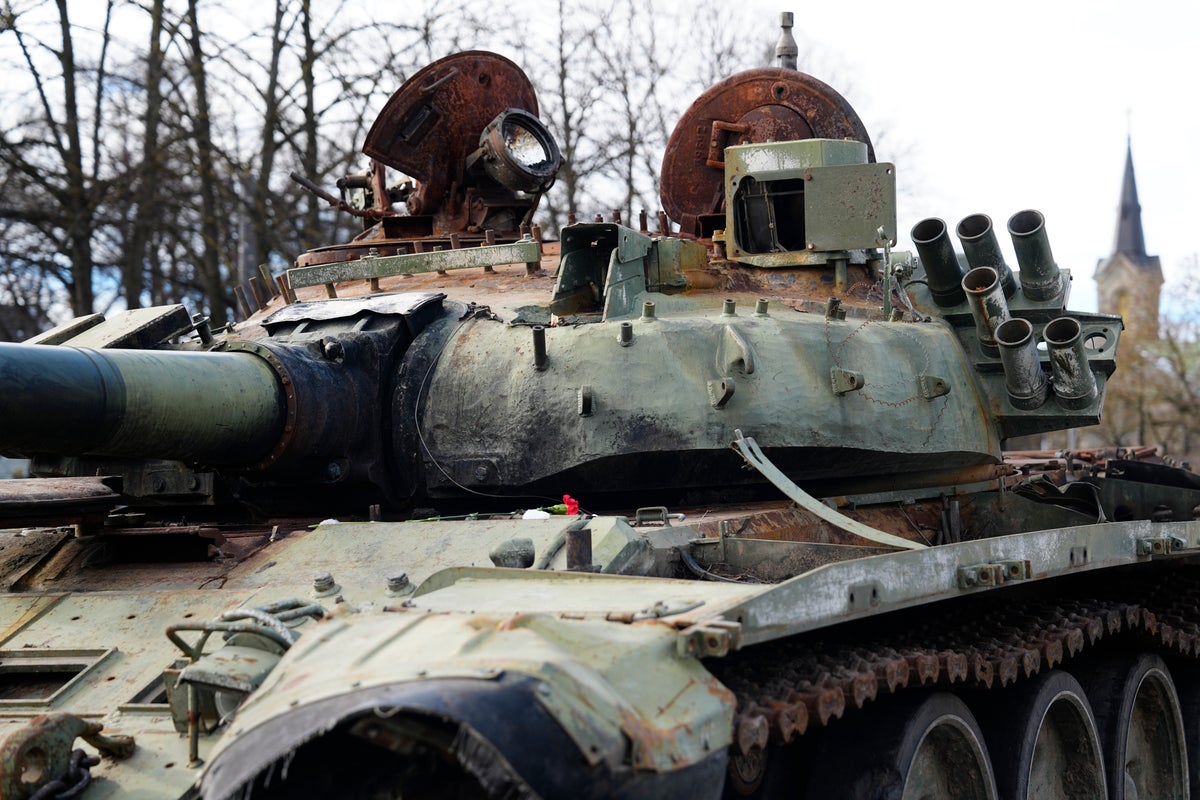
Burnt-out Russian tanks seized by Ukrainian forces last year have gone on display in recent days in the capitals of the three Baltics states, where Estonians, Latvians and Lithuanians are turning out to view them and snap photos in sympathy with the Ukrainians defending their homeland.
But among those visiting the tanks are also members of the countries' sizeable ethnic Russian minorities, some of whom placed flowers and lit candles to commemorate the fallen Russian soldiers and express support for Moscow.
The Russian gestures of support for Russia's side in the war have set off some arguments, and at least one fist fight in Vilnius — underlining the tensions that are simmering in the Baltic nations between the Baltic majorities and the countries' sizeable Russian minorities.
On Wednesday, supporters and opponents of the war argued in front of a burned-out Russian T-72 tank struck by Ukrainian forces near Kyiv on March 31. It stands on Freedom Square in the center of the Estonian capital, a space adorned with Ukrainian and Estonian flags and where the Ukrainian anthem could be heard from nearby St. John’s Church.
The Estonian Defense Ministry on Saturday called the tank “a symbol of Russia's brutal invasion. It also shows that the aggressor can be defeated. Let’s help Ukraine defend freedom.”
Last week, Ukrainian Defense Minister Oleksii Reznikov announced that the tanks were going on display in the three Baltic capitals, and to Berlin as museum exhibits, following similar displays in Poland and the Czech Republic last year.
Anatoly Yarkov, a 78-year-old Soviet army veteran who showed up to see the tank in Tallinn, said that he feels bitter about Ukraine fighting against Russia in a war that he said had been rooted in the 1991 collapse of the USSR.
“Russian tanks are burning again like it happened during the war with the Nazis,” Yarkov said. “The Russian people always stood against the Nazis, no matter what flag they used. And I’m very sorry to see that the Ukrainians aren’t on our side today.”
Russian government officials, including President Vladimir Putin, have promoted a false narrative that Moscow's military is fighting against neo-Nazis even though Ukraine has a Jewish president who lost relatives in the Holocaust and who heads a Western-backed, democratically-elected government.
As some Russians placed flowers on the tank in Vilnius, the Lithuanian capital, the city authorities put a garbage container in the vicinity with a sign saying it’s “for flowers, candles & Soviet nostalgia.”
Not all Russians are taking Moscow's side.
Marina, a 60-year-old Russian citizen who didn’t give her last name for reasons of personal security, said she condemned the invasion of Ukraine and hailed Ukrainians for fighting back.
“This Russian tank could have rolled into the Estonian city of Narva, which Putin might have declared a Russian city,” she said, adding that her children and grandchildren have Estonian citizenship. “And I understand very well that only heroic resistance of the Ukrainians saved my children from that bloody scenario unfolding in Estonia.”
Also visiting the tanks are Ukrainians who have been turned into refugees by the war.
Anastasia Olezhko, an 18-year-old who fled the Ukrainian city of Mariupol when Russian tanks fired on the city, said that “I saw such Russian tanks, and one of them destroyed my house in Mariupol, of which only the foundation was left.”
“How could I feel about it?” she exclaimed.
In Berlin, the tank also became a site of homage. Pro-Russia sympathizers placed red roses on a destroyed tank that was displayed in front of the Russian Embassy. The roses were eventually removed. The Russian Embassy denied that it had organized the placement of the flowers, but said that it welcomed the “heartfelt gesture by German citizens and our compatriots in Germany.”
___
Vanessa Gera reported from Warsaw, Poland. Frank Jordans contributed to this report from Berlin.







